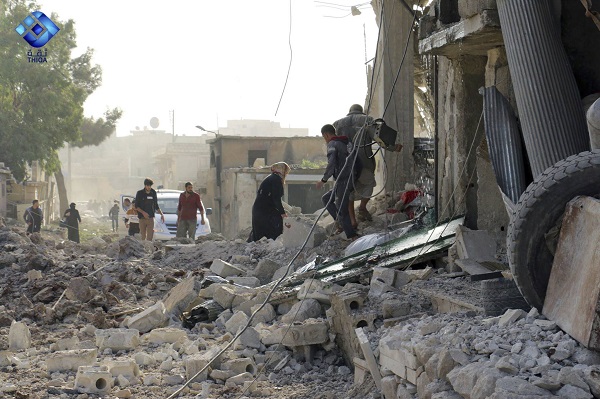Syrian rescue workers on Tuesday continued their search for victims still under the rubble a day after airstrikes hit a busy market in a rebel-held town in the country’s north.
By: AP
According to the Britain-based Syrian Observatory for Human Rights, there were at least three airstrikes on the market in the town of Atareb on Monday — those killed included six women, five children and three police officers. The Observatory’s director, Rami Abdurrahman, said the rest were male civilians.
The Syrian Civil Defense search-and-rescue volunteers, known as the White Helmets, told The Associated Press they gave up hope of finding more survivors after dawn, though recovery efforts continued. They said the death toll had climbed to at least 61 on Tuesday; 90 people were injured.
Atareb and the countryside around it remain outside the control of the government in Damascus. Government forces retook the nearby city of Aleppo, Syria’s largest, following a ferocious assault on the rebel-held neighborhoods there in 2015.
The town population swelled with the arrival of Syrians who fled from fighting elsewhere in the country’s north. Atarab’s market drew not just the townspeople but also shoppers from the countryside and nearby villages.
“You can see the body fragments in the rubble,” said Yasser Hmeish, a medical technician at the scene. “This morning I saw civilians and rescue workers trying to lift the cement chunks to find the missing.”
“There were restaurants, mobile phone shops, butchers: it was a market in the full sense of the word,” Hmeish added. “It’s been completely destroyed.” Videos from the scene show a totally collapsed building amid other smaller buildings, and rescuers stepping over the rubble to get to the areas where they pull out survivors.
The airstrikes ripped through the market, crushed buildings and damaged an adjacent traffic police station. Survivors found limbs in the rubble and bodies with heads crushed by the pressure of the blasts.
The Observatory said it couldn’t determine whether Russia or the Syrian government was behind the attack. The opposition Syrian National Coalition accused Russia, Syrian President Bashar Assad’ chief military backer.
The attack was the latest breach in a “de-escalation” agreement mediated by Russia that sought to protect the civilian population but that has largely proven unenforceable.
Also Tuesday, Syria’s government called on the United States to withdraw its forces from the country now that the fight against the Islamic State group is nearly over. The Foreign Ministry statement, carried by state-run media, said the presence of U.S troops will not force a political solution to the conflict.
The comments came a day after U.S. Secretary of Defense Jim Mattis said “we are not going to just walk away right now” before the U.N-backed political process yields results.
The United States “will not force a solution through military pressure but instead, [it] will prolong the crisis and make it more complicated,” the ministry said.
U.S troops and advisers are supporting the Kurdish-led Syrian Democratic Forces in their fight against Islamic State militants in northern and eastern Syria. Kurdish officials want the Americans to remain in the country to help prevent clashes with pro-government forces, which are also battling IS.
The SDF and Syrian government troops are racing for control of territories previously controlled by IS in eastern Syria. Syrian troops and allied militias have seized the last town near the border with Iraq, Boukamal, before losing it hours later in an IS counteroffensive. Meanwhile, SDF continues to battle IS militants on the opposite side of the river.
U.S. officials say they are maintaining contacts with their Russian counterparts to ensure no friction occurs between the two forces. Russia is a key ally of President Bashar Assad, along with Iranian-backed militias.
In Moscow, Russian Foreign Minister Sergey Lavrov said there was no agreement with the U.S. to have Iranian or pro-Iranian forces withdraw from areas near the Syrian border with Israel.
The U.S. is seeking a deal to push them away from the frontier with its ally Israel. Israeli Prime Minister Benjamin Netanyahu said Monday that his country would carry out operations inside Syria according to its “security needs.”
Israel has largely stayed on the sidelines of the Syrian war, but its officials have said they will not tolerate Iranian military presence in Syria. They have acknowledged carrying out dozens of airstrikes on suspected Iranian weapons shipments to the Lebanese militant group Hezbollah. Israel is also suspected of striking Syrian military installations.
Syria’s civil war, now in its seventh year, has killed at least 400,000 people and displaced 11 million — half of Syria’s pre-war population.


